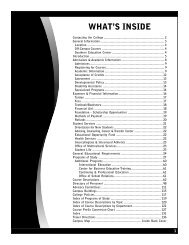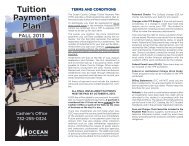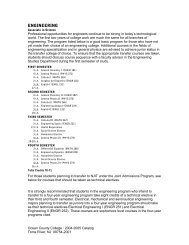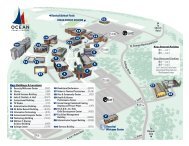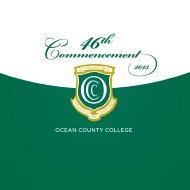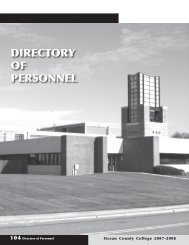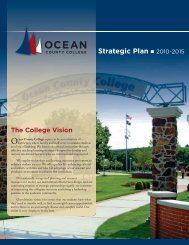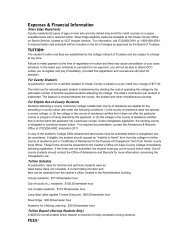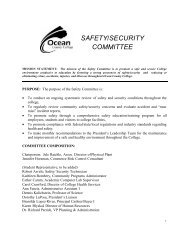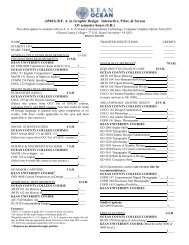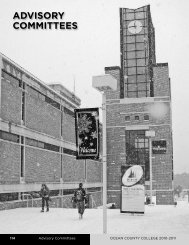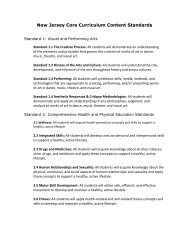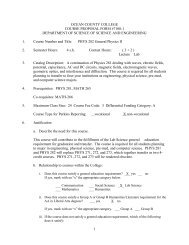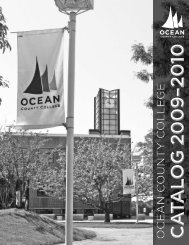current college catalog. - Ocean County College
current college catalog. - Ocean County College
current college catalog. - Ocean County College
Create successful ePaper yourself
Turn your PDF publications into a flip-book with our unique Google optimized e-Paper software.
alcohol & drug counseling • allied health<br />
ALDC 102 Addictions<br />
Counseling II<br />
3 cr.<br />
This course emphasizes standards for<br />
insuring thorough documentation; ethical<br />
aspects of addictions counseling; the<br />
counselor’s need for cultural competence,<br />
personal growth, and professional growth;<br />
counselor/client expectations based on<br />
goals, objectives, rules, and obligations;<br />
and the use of laboratory tests/results for<br />
determining a course of treatment. Students<br />
may enroll in ALDC courses to satisfy<br />
electives for the AS in Public Service and<br />
other OCC degree programs. Individuals<br />
already employed in fields related to<br />
Addictions Counseling and baccalaureate<br />
degree holders may enroll in these courses<br />
to become Certified Alcohol and Drug<br />
Counselors (CADCs) working under the<br />
supervision of agency directors or Licensed<br />
Clinical Alcohol and Drug Counselors<br />
(LCADCs).<br />
ALDC 103 Addictions<br />
Counseling III<br />
6 cr.<br />
This course examines the assessment aspect<br />
of addictions counseling and focuses on<br />
diagnostic summaries, initial interviewing<br />
skills, bio-psychosocial assessments,<br />
gambling addictions, dimensions of<br />
recovery, supervision and consultation, and<br />
the importance of community involvement.<br />
Students may enroll in ALDC courses<br />
to satisfy electives for the AS in Public<br />
Service and other OCC degree programs.<br />
Individuals already employed in fields<br />
related to Addictions Counseling and<br />
baccalaureate degree holders may enroll in<br />
these courses to become Certified Alcohol<br />
and Drug Counselors (CADCs) working<br />
under the supervision of agency directors<br />
or Licensed Clinical Alcohol and Drug<br />
Counselors (LCADCs).<br />
ALDC 104 Addictions<br />
Counseling IV<br />
6 cr.<br />
This course promotes competence in<br />
addictions counseling by focusing on<br />
the following topics: individual, group,<br />
and family counseling; client education;<br />
treatment of the addicted person; familial<br />
aspects of counseling; techniques of<br />
crisis intervention, and ways to provide<br />
community and professional education.<br />
Students may enroll in ALDC courses<br />
to satisfy electives for the AS in Public<br />
Service and other OCC degree programs.<br />
Individuals already employed in fields<br />
related to Addictions Counseling and<br />
baccalaureate degree holders may enroll in<br />
these courses to become Certified Alcohol<br />
and Drug Counselors (CADCs) working<br />
under the supervision of agency directors<br />
or Licensed Clinical Alcohol and Drug<br />
Counselors (LCADCs).<br />
Allied health<br />
AHMT 110<br />
Medical Terminology 3 cr.<br />
This course will serve as a basis for students<br />
in understanding the specialized language<br />
used in fields related to medicine and<br />
healthcare technologies. Content will range<br />
from the origin and breakdown of words to<br />
a correlation of word elements with basic<br />
anatomy, physiology and disease processes<br />
of the human. A systems approach will be<br />
used to focus learning and provide the<br />
student with an organizing framework for<br />
analysis and application.<br />
AHMT 210 Advanced Medical<br />
Terminology<br />
3 cr.<br />
This course will serve as a continuation<br />
for students who have been successful in<br />
completing a basic medical terminology<br />
course and have mastered concepts in<br />
understanding the language of medicine.<br />
It will build upon previously learned<br />
techniques, analysis of terms, and expand<br />
into specialty areas related to the health<br />
technologies. Content will be organized<br />
around a systems approach with correlation<br />
of terms to the basic anatomy, physiology<br />
and disease processes that occur in humans.<br />
Prerequisite(s): AHMT 110.<br />
American sign<br />
language<br />
ASLN 100 Basic American Sign<br />
Language I<br />
3 cr.<br />
This course introduces students to the<br />
language of the deaf community. Students<br />
will examine foundational aspects of<br />
American Sign Language. Information<br />
regarding deaf culture will be introduced<br />
in addition to fingerspelling and various<br />
numbering systems in American Sign<br />
Language. Receptive and expressive skill<br />
development application is reinforced<br />
through interactive activities within the<br />
classroom setting. This course requires<br />
students to complete 5 contact hours with<br />
the deaf community. Code 2 course fee.<br />
ASLN 102 Basic American Sign<br />
Language II<br />
4 cr.<br />
This course introduces students to complex<br />
everyday language functions of American<br />
Sign Language. These functions will<br />
help students establish and maintain<br />
interpersonal relationships within the deaf<br />
community and the classroom environment.<br />
Various skills based activities will allow<br />
students to further increase competency in<br />
American Sign Language in order to express<br />
and understand signed conversations. This<br />
course requires students to complete 5<br />
contact hours with the deaf community.<br />
Prerequisite(s): ASLN 100. Code 3 course<br />
fee.<br />
american sign language<br />
ASLN 105 Deaf Culture<br />
& History<br />
3 cr.<br />
This course introduces the history and<br />
culture of the deaf. Discussion will include<br />
the values, norms, identities, traditions,<br />
and subcultures within the larger culture<br />
of the deaf community. Questions such as<br />
the nature of sign language, the education<br />
of deaf individuals, and historical treatment<br />
of deafness will be explored. Code 3 course<br />
fee.<br />
ASLN 110 Intermediate American<br />
Sign Language I<br />
4 cr.<br />
This course engages students in the<br />
composite language functions of American<br />
Sign Language. Focus will be placed on<br />
higher level communication in order to help<br />
students broaden and deepen interpersonal<br />
relationships with the deaf community, and<br />
increase skill level using more sophisticated<br />
sign language skills. Skill development<br />
application will be reinforced through<br />
interactive activities in order to achieve a<br />
broader scope of understanding complex<br />
discourse. This course requires students<br />
to complete 15 contact hours with the deaf<br />
community. Code 3 course fee.<br />
ASLN 115<br />
Grammar & Syntax 3 cr.<br />
This course examines the grammar and<br />
syntax of American Sign Language. Students<br />
will develop skill application through<br />
modeling signed stories as well as translating<br />
stories from English to grammatically<br />
and syntactically correct American Sign<br />
Language. Components of American Sign<br />
Language such as transcription symbols,<br />
sentence types, classifiers, non-manual<br />
behaviors, pronominalization, locatives,<br />
pluralization, subjects and objects, verbs,<br />
and temporal and distributional aspects<br />
will be explored. Prerequisite(s): ASLN 110.<br />
Code 3 course fee.<br />
ASLN 120<br />
Interpreting Theory I 3 cr.<br />
This course examines the history of<br />
interpreting, interpreting in a variety of<br />
specialized settings, interpreting process,<br />
attitudes, and the role of the interpreter.<br />
Ideological components, principles, and<br />
practices of interpreting for the Deaf<br />
community will be examined. Students<br />
will learn about national certification,<br />
educational licensure and state screening.<br />
Students are required to accrue 10 mandatory<br />
field observation hours observing sign<br />
language interpreters with five or more years<br />
of experience. Prerequisite(s): ASLN 110.<br />
Code 3 course fee.<br />
62 Course Descriptions<br />
<strong>Ocean</strong> <strong>County</strong> <strong>College</strong> 2013-2014



